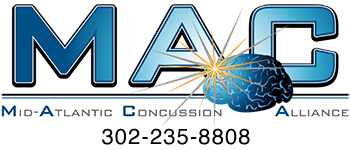With temperatures plummeting in many places in the country, including our mid-Atlantic area, here’s a timely topic: a possible new treatment for mild traumatic brain injury (TBI) called therapeutic brain cooling for concussions.
Cool is…Well…Very Cool!
Applying cold to an injury is not a new concept. Athletes do it all the time. And lots of folks grab bags of frozen peas from the freezer after a minor fall, knowing that the coolness, when immediately applied, can help reduce swelling. Now, researchers are studying how reducing the brain temperature after a mild traumatic brain injury (TBI) can mitigate long-term damage.
High Occurrence of Concussions
A concussion is when the brain is shaken inside the skull after an individual receives a blow to the head. An estimated 1.7 million new cases of traumatic brain injury are reported each year in emergency rooms. According to the University of Pittsburgh Medical Center (UPMC) Center for Sports Medicine, Between 1.7 and 3 million sports- and recreation-related concussions happen each year. Luckily, most concussions resolve in less than 10 days with medical supervision.
Therapeutic Brain Cooling for Concussions and Targeted Temperature Management
For years, researchers have studied temperature and how it relates to long-term outcomes after injury and during recovery. Targeted temperature management (TTM), also known as therapeutic hypothermia (TH), has been used for years in cardiopulmonary bypass surgery, after strokes and cardiac arrests. But new research may lead to similar treatment for concussions.
Recently, engineers at the University of Wisconsin-Madison published their findings in the journal PLOS ONE. They cooled injured brain cells and found they could keep the cells healthy even though the cells had just “suffered” a concussion. The study discusses documented benefits of cooling including reduction of intracranial pressure, inflammation and cerebral edema.
Possible Help for Mitigating Long-Term Effects of Concussion
Recurrent episodes of even mild TBI is becoming linked to long-term negative changes in the body. We know that hyperthermia (increased body temperature), common after TBI, increases inflammatory activity that can damage neurons. The basic thinking is that if hyperthermia worsens TBI, could hypothermia (drop in body temperature) help mitigate some of the negative effects?
TBI can turn on biochemical pathways that result in neurodegeneration, a progressive deterioration that involves loss of function in brain cells due to multiple head injuries. These adverse incidences are linked to long-term neurodegenerative diseases like Alzheimer’s and Parkinson’s. The hope is that understanding how we could safely cool the brain in a clinically supervised setting following concussion will hopefully help avoid effecting long-term brain health.
A Word About the Therapeutic Hypothermia in TBI Study
Of the University of Wisconsin-Madison’s brain cooling study, ScienceDaily notes that “the process is a bit more finicky than just applying an ice pack to the head.”
Indeed, parameters in terms of timing, exact temperature and means of isolating the cooling have yet to be determined. It’s not as easy as lowering an individual’s entire body temperature since this could have negative impacts on the immune system. Additional therapeutic cooling products like the Cryohelmet are being studied for migraine relief, to promote healthier sleep and also to help possibly manage concussion symptoms, but we have no information yet on the efficacy of the latter.
Safely Treating Traumatic Brain Injuries
At MAC Alliance, we’re always interested in reading about such studies. Because there’s much more to learn before we would consider implementing a targeted temperature management technique in a clinical setting, we warn patients that any sort of “icing” of the head should never be attempted without medical supervision. If you suspect you or someone else has sustained a concussion, please visit a medical professional for proper care and recommendations for treatment.
Staying Ahead of the Curve with Advanced Concussion Tools
 While we are constantly monitoring the latest concussion studies and news, MAC Alliance also stays ahead of the curve with tools such as our revolutionary new MAC Concussion Cart which offers medical professionals, sports organizations, healthcare providers and more the ability to facilitate fast, accurate and portable concussion screening and treatment using advanced testing and telemedicine. Available for lease in March 2021, the MAC-Cart is a game changer in concussion care. According to Dr. Jack Norsworthy, D.C., D.A.A.M.L.P., founder & director of Comprehensive Accident & Injury Center, “Concussions are probably one of the most underdiagnosed and under-documented injuries that affect accident patients, and being able to get a clear diagnosis so easily and quickly using the MAC-Cart is something that can truly be life altering for those struggling with the concussion-related problems.”
While we are constantly monitoring the latest concussion studies and news, MAC Alliance also stays ahead of the curve with tools such as our revolutionary new MAC Concussion Cart which offers medical professionals, sports organizations, healthcare providers and more the ability to facilitate fast, accurate and portable concussion screening and treatment using advanced testing and telemedicine. Available for lease in March 2021, the MAC-Cart is a game changer in concussion care. According to Dr. Jack Norsworthy, D.C., D.A.A.M.L.P., founder & director of Comprehensive Accident & Injury Center, “Concussions are probably one of the most underdiagnosed and under-documented injuries that affect accident patients, and being able to get a clear diagnosis so easily and quickly using the MAC-Cart is something that can truly be life altering for those struggling with the concussion-related problems.”
For more information, please contact our office at 302-235-8808 or email MACcart@macphysicians.com.










